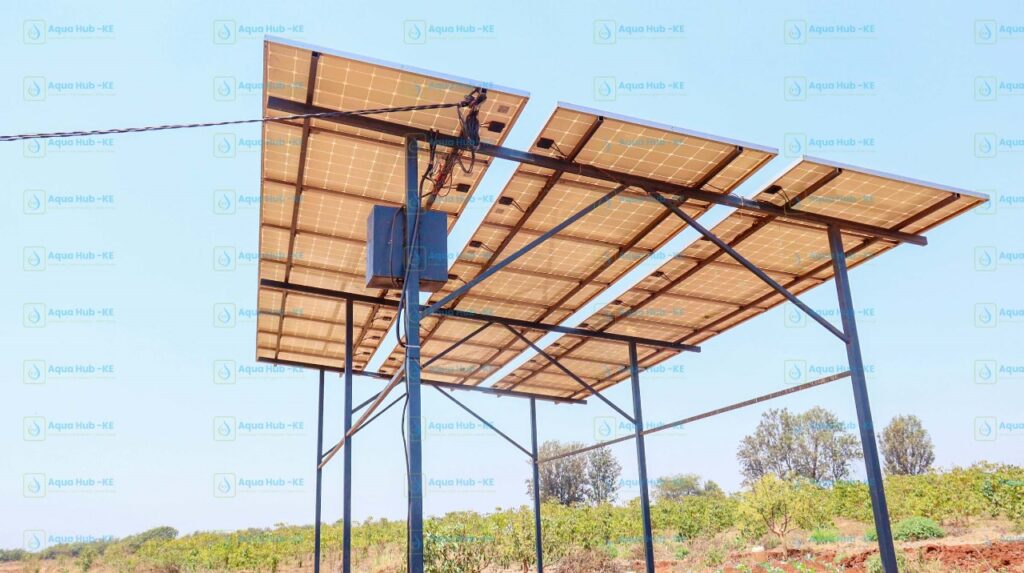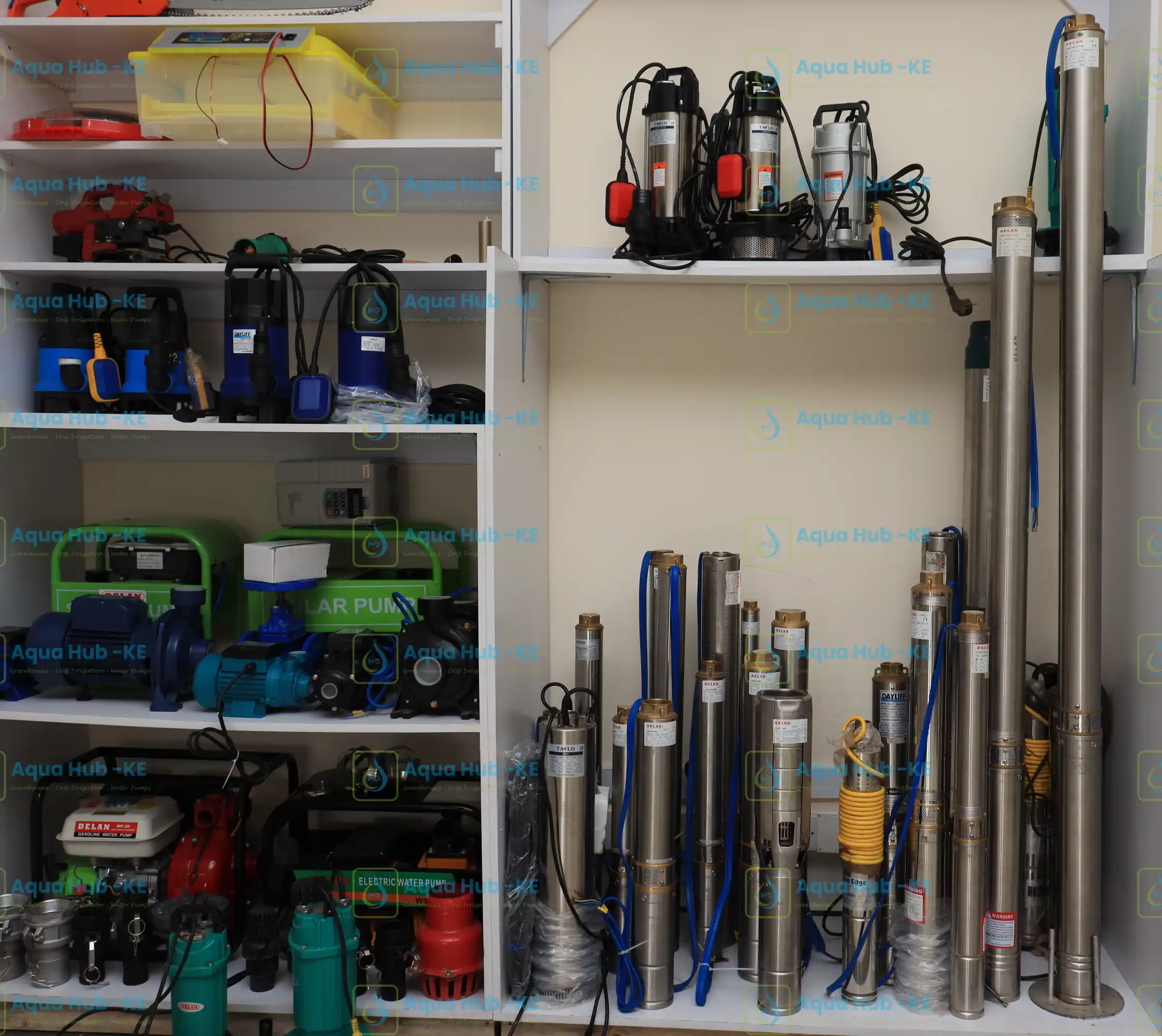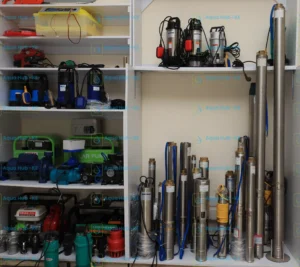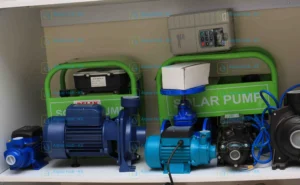Solar pumps in Kenya are sold between KES 25,000 and 150,000, depending on the size, type and performance. One of the leading suppliers, Aqua Hub Kenya, offers reliable and high-quality solar water pumps that fit both small and large farm needs.
Call 0790719020
In this guide, you’ll learn everything about solar water pumps and why so many people are switching to this smart, sustainable solution
Aqua Hub Kenya deals with solar water pumps and borehole submersible pump and surface pump installation. Watch the video below to learn more.
What is a Solar Pump?
A solar pump is a water pumping system that uses sunlight instead of electricity or diesel fuel. Solar panels capture energy from the sun, convert it into electricity, and power a motor that drives the pump. The pump then lifts or pushes water from a source like a borehole, river, or tank to where it’s needed for example, into a storage tank, irrigation system, or water storage reservoirs.
Access to reliable water is one of the biggest challenges for many farmers and households in Kenya. Power shortages, high fuel costs, and unreliable rainfall make it difficult to grow crops or provide enough water for animals. But in the past few years, something has changed more Kenyans are turning to solar-powered water pumps.
Components of Solar Pump System
A typical solar pumping system has three main components. First, there are solar panels that generate electricity. Then, there’s a controller that manages how much power flows into the pump to protect it from damage. Finally, there’s the pump itself, which can be placed in the water (a submersible pump) or on the ground surface (a surface pump).

Some solar pumps work using alternating current (AC) and require inverters to convert direct sun power to AC. If not converted, the direct current from the PV panels will damage the AC pumps.
Suction and delivery pipes are important for solar pumps to deliver water from the source to the required point of use. Includes PVC suction pipes and HDPE or PVC delivery pipes.
Working Principle of Solar Pumps
Solar pumps use energy from the sun to move water from boreholes, wells, rivers, or tanks to where it’s needed. They’re clean, quiet, and save money over time.
Solar pumps don’t need grid power or fuel, which makes them ideal for remote or rural areas. Once installed, they can run for years with little maintenance, especially in sunny regions like most parts of Kenya.
Types of Solar Pumps in Kenya
Solar pumps come in different types depending on where you want to get water from and how deep the source is. The main types are submersible solar pumps, surface solar pumps, and solar irrigation pumps.
Submersible solar pumps are placed deep inside boreholes or wells. They are designed to push water upwards from great depths even more than 100 meters underground. These are perfect for boreholes and permanent water sources, and they’re common in counties like Kajiado, Machakos, Kitui, and parts of Rift Valley where boreholes are the main water source.
Surface solar pumps, on the other hand, sit above the ground and pull water from shallow sources like rivers, ponds, or tanks. They work best for depths less than 10 –15 meters. Many small-scale farmers and homesteads use surface pumps for daily use or small irrigation systems because they are cheaper and easier to install.
Finally, there are solar irrigation pumps, which are made specifically for farms. They can power drip or sprinkler systems directly during the day when sunlight is available. Some of these come as complete kits that include solar panels, a controller, pipes, and sprinklers, making them ready for installation without extra components.
Each type of solar water pump has a specific recommended water use. The right one for you depends on your water source, how far you need to move the water, and your budget.
Benefits of Using Solar Pumps in Kenya
There are many reasons why solar pumps have become so popular in Kenya in recent years. The biggest reason is cost savings. Once installed, solar pumps don’t require fuel or grid electricity, so they reduce monthly expenditure on electricity or fuel to almost zero.
Another big benefit is reliability. In many rural areas, electricity is not always available or stable. Diesel prices also keep rising. A solar pump works provided sunlight is available, which Kenya receives in abundance throughout the year. That means consistent water supply even during dry seasons.
Solar pumps are also environmentally friendly. They don’t produce smoke, noise, or harmful emissions. This makes them ideal for eco-conscious farmers and communities that want to reduce their carbon footprint.
Maintenance is simple. Most systems need only frequent cleaning of the solar panels and checking for loose wires or blocked pipes. With good care, a solar pump can last 10 to 20 years.
Lastly, solar pumps bring independence. You no longer need to rely on expensive fuel deliveries or unstable power lines. You control your water supply, and that brings peace of mind especially during long dry spells.
Solar Pump Prices in Kenya
One of the most common questions people ask is: How much does a solar pump cost in Kenya? The answer depends on several things, such as the type of pump, how deep your water source is, how much water you need, and whether you already have solar panels or need a complete kit.
For small farms or homes that use surface water, a small surface solar pump can cost between KES 20,000 and KES 40,000. These pumps can move water from rivers or tanks to nearby gardens or livestock areas.
If you need to draw water from a borehole, you’ll likely need a submersible solar pump. Prices for these range from KES 50,000 to 150,000, depending on the depth and the size of the motor. The deeper the borehole, the more powerful the pump required.
For larger farms, solar irrigation kits that include panels, controllers, and sprinklers can range from KES 80,000 to 200,000 or more. These systems can water several acres efficiently and are a long-term investment that saves on fuel and maintenance costs.
While the upfront price may seem high, the long-term savings are significant. In just a few months, most users recover their costs from the money saved on fuel and electricity.
Top Solar Pump Brands and Suppliers in Kenya
The most trusted water pump dealer in East Africa is Aqua Hub LTD. They stock top rated brands of solar pumps in Kenya for sustainable irrigation and home use.
Our solar pumps are from top brands as discussed below.
Davis & Shirtliff – One of the top water pump brands in Africa with wide range of solar water pumps. Common pump models include Sunflo series, DSD series and DDP.
Lorentz – known for its high-quality borehole and irrigation pumps that perform well even in harsh conditions. They’re a bit more expensive, but their efficiency and durability make them worth it for deep boreholes and commercial farms.
Futurepump – a brand that focuses on small-scale farmers. Their solar pumps are lightweight, portable, and easy to use. They’re ideal for farmers who want to irrigate small plots of land using river or pond water.
How to Choose the Right Solar Pump
Choosing the right solar pump may feel confusing at first, but it becomes easier when you understand what you need. The first thing to consider is your water source. Is it a deep borehole, a shallow well, or a river? The depth and distance of the source will determine the pump type and power needed.
Next, think about your daily water needs. If you’re running a small household or watering a small garden, you don’t need a high-capacity system. But if you have several acres of crops or livestock, a higher-capacity pump will serve you better.
Your budget is also important. Remember, the cheapest option is not always the best. It’s better to choose a system that’s efficient, durable, and supported by a reliable supplier. Look for pumps with warranties and available spare parts in Kenya.
Also, consider maintenance and installation. Some pumps are plug-and-play, while others require professional installation. If you live far from towns, go for a system that’s easy to maintain on your own.
Lastly, check if you can get financing or subsidies. Many programs now support farmers who want to adopt solar technology. Asking your supplier about these options can make your purchase more affordable.
Solar Pumps Installation and Maintenance Tips
Solar Pumps operates well if it is correctly installed and well maintained. While some people often want to install it on their own, it is usually good to have a pump technician do it. Solar pumps, especially borehole submersible are complex requires proper panel positioning and electric connection.
Maintenance is essential to keep the pump system operational and in good condition. It is easy just involves regular cleaning of solar panels to remove dust. The pump and pipes need to prevent from debris or clogging. Also check power cables for possible wear or damage.
If your pump system uses a battery, make sure it’s kept in a cool, dry place and checked periodically. Most modern systems have controllers that protect the pump from power fluctuations or running dry, which extends their lifespan.
With basic care, a solar pump can serve you for more than 10 years. When you compare that to the current fuel costs of a diesel pump, it’s clear that solar is the smarter choice for long-term water security.
Where to Buy Solar Pumps in Kenya
You can buy solar pumps by ordering online from Aqua Hub LTD or visiting their offices in Nairobi. They are accredited to supply top brands of water pumps in Kenya including Davis & Shirtliff, Delan and Grundfos pumps.
Real Story: How Solar Pumps Changed One Farmer’s Life
To see how much difference a solar pump can make, let’s look at a real example. In Kitui County, a farmer named Mary used to spend over KES 10,000 every month on diesel to pump water for irrigating her tomatoes and onions. Sometimes, she couldn’t afford diesel fuel, and her crops suffered.
In 2023, she joined a group supported by an NGO that helped her buy a solar irrigation kit. The system included solar panels, a controller, drip irrigation kits and a submersible pump. Within a few months, Mary’s fuel costs dropped to zero. Her farm now gets water every day, and she has even expanded to grow new crops.
“I never thought the sun could give me this much power,” she says with a smile. “Now I have water, healthy crops, and more income. I’m no longer afraid of drought.”
Stories like Mary’s are becoming more common across Kenya, proving that solar power is not just cost saving, but dependable and environment friendly.
Frequently Asked Questions
A solar pump is a type of water pump that uses solar energy from PV modules to pump water from boreholes, rivers and wells.
Prices start from around KES 20,000 for small surface pumps and can go up to KES 200,000 or more for large systems. The total cost depends on the size of the system and whether it includes panels and accessories.
A good-quality solar pump can last 10 to 20 years if properly maintained. The solar panels themselves can last even longer up to 25 years.
Most solar pumps work during the day when there is sunlight. However, if the system includes a battery or water storage tank, it can still provide water at night or during cloudy weather.
That depends on your water source and farm size. Surface pumps work well for shallow sources, while submersible pumps are ideal for boreholes. For larger farms, complete solar irrigation kits with controllers and sprinklers are best.
Not always. Many modern systems pump water directly when the sun is shining and store it in tanks for later use. Batteries are optional and mainly used when you need pumping after sunset.
Determine the water needs, total dynamic head and flow rate, then evaluate the power required as per the borehole depth. Match the power required to an appropriate panel capacity and number. The total panel capacity should be 1.5 times the pump’s power rating to ensure it can run efficiently even with less-than-ideal sunlight.
Solar pumps use sun power to pump water while diesel pump operate on diesel fuel to generate power that moves water.
Clean solar panels.
Inspect the wiring to ensure it is not worn out.
Measure the water output
Inspect the pump, check the noise or vibrations
Aqua Hub Kenya.





